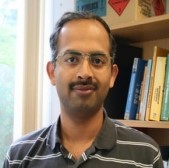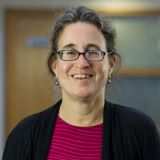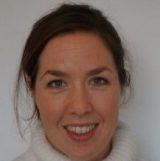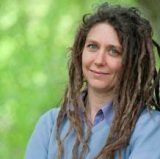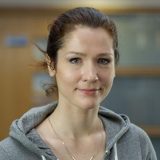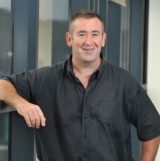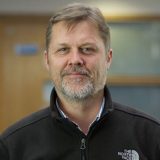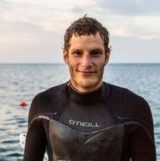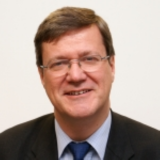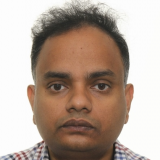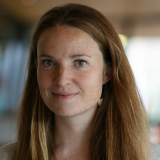Prakash is academic lead for the civil and structures research group at Exeter. His research interests are broadly in the design and management of civil infrastructures, such as bridges. He has significant experience in: the experimental and numerical modelling of flow and scour (erosion) around hydraulic structures such as bridge piers; the use of applied computing techniques including Building Information Modelling (BIM) for construction automation and design; the development of finite element modelling-based and data-driven strategies for interpreting measurements from bridge structural health monitoring; and the application of optimization methods for structural design problems (e.g. design of trusses and moment-resisting steel frames).
Peter Melville-Shreeve
Dr Peter Melville-Shreeve has worked in consultancy, startups and academic roles over the last decade. He works closely with the Chartered Institution of Water and Environmental Management’s (CIWEM’s) policy team to support sustainable water management systems and chair’s CIWEM’s Water Reuse Task & Finishing Group. Much of Peter’s early research focusses on rainwater management systems and the need for dual purpose designs – which can mitigate droughts and floods. His thesis highlighted the opportunities for Internet of Things technologies to be harnessed to reduce water demand AND manage stormwater flood risk. He consequently founded and exited a technology business which developed analytics and control systems to enable such technologies to be implemented at a range of scales.
Rich Crane
Rich’s key research and teaching areas are extractive metallurgy, materials science, nanotechnology and applied geochemistry for a range of applications including the development of novel mining techniques, mine site reclamation, waste treatment, water treatment and contaminant transport.
More information on Rich’s institutional profile
lora fleming
Lora is the director of the Centre for Environment and Human Health and chair of oceans and human health at the University of Exeter Medical School. She is a board certified occupational and environmental health physician and epidemiologist with over 30 years of experience and expertise in environment and occupational exposures and human health research and training.
Nina Wedell
Nina is an evolutionary biologist with research interests focused on the evolutionary ecology of sex. She has worked extensively on various aspects of sexual selection and sexual conflict, in particular on the role of selfish genetic elements in reproductive biology.
Gabriel Yvon-Durocher
Gabriel researches the effects of environmental change on the structure and functioning of ecosystems (which comprise groups of species, their interactions with one another and with the physical and chemical environment in which they exist). His work spans multiple levels of biological organisation, from sub-cellular biochemistry to the dynamics of ecosystems, and searches for similarities across aquatic and terrestrial systems. The ultimate goal of his work is to develop a predictive ‘tool box’ to forecast how ecosystems will change in a world increasingly dominated by humans and the oceans.
Michiel vos
Michiel combines approaches from microbiology, evolutionary ecology and population genomics to study bacterial evolution, focusing on horizontal gene transfer, sociomicrobiology and pathogens in the environment. Key projects include exploring the ecological drivers of antimicrobial resistance and virulence in aquatic bacteria.
Rod Wilson
Rod is a comparative physiologist. He aims to provide a more holistic understanding of homeostasis in aquatic animals, both fish and invertebrates, freshwater and marine. This includes studies of how anthropogenic and natural environmental changes impact upon physiology and behaviour in the wild, and how to use physiology to help improve the sustainability of aquaculture (including animal growth efficiency and health, pathogen/parasite resistance, and farm effluent output). He also studies the reverse process: how physiological processes in aquatic animals can influence the regional and global environment in freshwater and the oceans.
Joanie Willett
Joanie is interested in the complex inter-relationship between identity, the economy, and the environment and exploring sustainable communities through theory, practice, policy and governance.
Charles tyler
Charles is a reproductive physiologist and environmental biologist. His research interests include mechanisms of endocrine disrupting chemicals and nanoparticle ecotoxicology and assessing population level effects of contaminants in wildlife (primarily fish).
Kelly thornber
Kelly’s research focuses on the global threat of antimicrobial resistance and developing more sustainable aquaculture practices, both in the UK and globally.
Jamie stevens
Jamie is an evolutionary biologist with interests in molecular ecology, population genetics and evolution. Two key strands are fish population genetics, and parasite systematics and evolution. He focuses on questions in the field of population/conservation genetics, with particular emphasis on applying knowledge of population genetic process to the management and conservation of Atlantic salmon and trout, and a variety of marine organisms, including sea fans and lobster, with the aim of understanding gene flow and connectivity in relation to the design and designation of marine protected areas.
Eduarda santos
Eduarda is an environmental biologist investigating reproductive development and function and the susceptibility of these processes to disruption by environmental stressors. Her research focuses on fish and has ranged from investigating the endocrine control of reproduction to addressing the population level effects of chemical exposure for wild fish, using systems biology strategies.
clare saunders
Clare researches social movements, protest and environmental politics. Her work has been particularly focused on environmental and global justice movements, although she has recently been engaged in a pan-European study of protest on a range of issues. Her current work looks at pro-environmental behaviour change – looking especially at energy use and clothing – and climate change policy networks.
Aimee Murray
Aimee’s research area is antimicrobial resistance in the environment, particularly due to anthropogenic impacts in wastewater and receiving environments. This includes evolution and ecology of antimicrobial resistance, direct selection at low concentrations and co-selection by other antimicrobials and non-antimicrobial compounds, environmental risk assessment, and developing and validating the novel ‘SELECT’ method for rapid determination of selective concentrations of antibiotics and environmental surveillance of antimicrobial resistance. She has a long-standing collaboration with AstraZeneca and engaging with industry and policy makers.
ilya maclean
Ilya is an applied ecologist interested in climate-vegetation interactions at the scales relevant to management and decision-making. He has expertise in microclimatology, remote-sensing and fine-scale hydrological modelling.
chris lowe
Chris is an aquatic Microbial Ecologist (mainly marine). He looks particularly at algal bloom impacts on shellfisheries (e.g. mussel farms) and reservoirs. He is an expert in Cyanobacteria, working with Canadian partners. His focus is on ecological implications rather than applied science. He has close ties with Plymouth Marine Laboratories, where single cell culture takes place and linked to genomics.
anne leonard
Anne’s research focuses on marine systems and epidemiology. She studies catchment-level processes contributing to the transmission of antibiotic resistant bacteria in coastal bathing waters, with a view to identifying mitigation strategies to reduce the spread of antibiotic resistant bacteria in the environment. She is particularly interested in recreational waters, transmission in coastal bathing waters and microbial genes associated with land uses and re-use of water and crop irrigation.
Brendan godley
Brendan’s wide ranging research interests are in biodiversity conservation. He largely focuses on the study of marine vertebrates (turtles, mammals, birds and sharks) and interdisciplinary approaches to conservation research, including focussing on the issue of microplastics in our oceans.
will gaze
Will research is in antimicrobial resistance in farmed and natural environments, including major elements of environmental sampling and wide-ranging analytical methodologies. This includes AMR evolution in the environment, using in situ and in vivo experiments, landscape scale dissemination of AMR and human exposure and transmission studies. Projects are divided into three main themes: ecology, evolution and public health perspectives. These map onto those identified in successive WHO, EU and UK AMR action plans facilitating interdisciplinary research approaches and joined up thinking.
tamara galloway
Tamara studies the biological effects of environmental pollutants in human and wildlife populations. Using a systems wide approach to address how pollutants damage ecosystems, how animals evolve tolerance and resistance in polluted environments and what makes some animals more sensitive than others. She has worked with funders to develop a predictive capability of the likely outcome for natural populations of pollutants, such as nanomaterials, micro and nanoplastics.
Guangtao Fu
Guangtao’s research is focused on developing and applying new computer models, data analytics and artificial intelligence tools to tackle urban water challenges in water supply resilience, network leakage, flood risk, urban stormwater and wastewater management.
Raziyeh Farmani
Raziyeh specialises in urban water systems modelling, water resources management and asset management and has expertise in multi-objective optimisation of water networks. Her research interests covers evolutionary optimisation, artificial intelligence and data mining.
Robert ellis
Rob’s research focuses on adaptation and acclimation in animals exposed to environmental change. He’s interested how the mechanistic understanding of animal physiology can be used to improve the productivity and sustainability of aquaculture in a wide range of production settings, and how aquaculture can be used to help secure future marine ecosystems in the face of climate change impacts.
Slobodan Djordjevic
Slobodan researches the development and application of advanced methodologies and software tools for water management. These include: drainage and floods simulation, impacts of flooding, effects on human health and impacts on road transportation, resilience to diverse extreme weather events in the context of climate change, tidal energy extraction, water quality modelling, river and coastal engineering, water-food-energy nexus, cascading effects between water, waste, energy, transportation and other infrastructure systems, nature-based solutions, and drought risk management.
Albert Chen
Albert’s research focuses on water and human environment systems. Particular focus is on: hydraulic modelling, urban drainage, flood forecasting, innovation technology applications, water-food-energy-ecosystems nexus, climate change impact on critical infrastructure, prediction of water-borne disease, hazard impact and cascading effects assessment, and mitigation and resilience strategies.
DAVID BUTLER
David’s research area is urban water management, including sustainable and resilient water systems, integration and control and water-energy-carbon interactions.
Angus Buckling
Angus is an experimental biologist interested in links between water and health. He works on evolutionary ecology of microbes, primarily by studying evolution in real time in controlled environments (experimental evolution).
Ross Brown
Ross’ research focuses on refining environmental risk assessment approaches to safeguard aquatic ecosystems from pollution and to facilitate the sustainable development of aquaculture.
Sangaralingam Ahilan
Sangaralingam’s main interests are in sustainable urban flood risk management and the long-term performance of sustainable drainage systems, using detailed hydrological and hydro-morphodynamic modelling. He is also analysed SME behaviour in flooding aftermath.
Ian Bateman
Ian is an environmental economist, interested in ensuring sustainable wellbeing through the integration of natural and social science knowledge within decision making and policy. Particular interests lie in the fields of quantitative analysis, integrated modelling and the valuation of non-market benefits and costs.
Kate Baker
Based in the Centre for Water Systems, Kate is the lead for community engagement on two European Union funded projects, NextGen (Living Labs for Circular Economy in the Water Sector) and LOTUS (International Cooperation for Low-cost innovative Technology for water quality monitoring and water resources management for Urban and rural water Systems in India).

